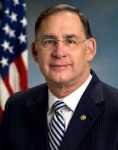- Supporting Americans with Disabilities and Their Families (3/6/25)
- Standing Up for Sportsmenís Access and Safety (2/20/25)
- Bringing Farm Country Voices to Washington (2/12/25)
- A New Front in the Fight Against Prostate Cancer (2/6/25)
- Taking Action to Reverse Immigration Failures and Protect Communities (1/30/25)
- Setting the Agenda for 2025 (1/22/25)
- Making progress for Arkansasís water infrastructure (1/16/25)
Arkansas children struggling with hunger during pandemic
Arkansas children struggling with hunger during this public health crisis will be getting additional support now that the U.S. Department of Agriculture (USDA) has approved the state’s operational plan for the Pandemic Electronic Benefit Transfer (EBT) program.
Created by the Families First Coronavirus Response Act, the program provides assistance to families of children eligible for free or reduced-price school meals who have been unable to benefit from these programs while closures are in place.
Over 300,000 children in Arkansas are eligible for assistance during the academic year. With schools closed, the pressure on parents to provide their children healthy meals has intensified. Many of these families were already struggling to make ends meet before COVID-19 appeared. They now find themselves facing even more difficult financial hardships as a result.
The Pandemic EBT program will help relieve some of that stress by providing qualifying families with assistance to account for meals that their children would have received at school.
Unfortunately, food insecurity issues facing Arkansas children won’t disappear once the coronavirus crisis is behind us. The challenge arises every summer. When the school year ends, it takes with it the reliable prospect for a healthy breakfast and lunch for children who participate in the program.
I am leading the charge to make federal child nutrition programs more efficient, flexible and better equipped to reach those in need—like the one in four Arkansas children struggling with hunger—during the summer.
The Hunger-Free Summer for Kids Act of 2019—bipartisan legislation I introduced with Senator Patrick Leahy (D-VT)—will add flexibility to the USDA’s Summer Food Service Program (SFSP), which provides access to healthy lunch and snacks for children from low-income families when school is out.
The SFSP is hamstrung by rules that date back to the 1960s and dictate a one-size-fits-all approach to the problem. Currently, children must travel to a central location and eat their meals together. In rural areas, it can be difficult for children to reach a site, if one even exists. In suburban and urban areas, inclement weather or violence can keep children from these locations and cause them to miss a meal. Because of the rigidity of the program, only 17 percent of eligible students actually receive summer meals.
The Hunger-Free Summer for Kids Act of 2019 would allow for meals to be consumed off-site through innovative means like mobile feeding and backpack meal programs. It also would authorize an EBT program for summer.
Our bill pre-dates the current public health emergency, but the efforts underway now mirror the reforms we’ve outlined for the summer meals program.
To reduce exposure risks for COVID-19, the Families First Coronavirus Response Act authorized nationwide waivers allowing off-site meal distribution to a parent or guardian to take home to their children. Our bill would create a similar option during summer, since requiring children to receive meals at a central location while school is out is often impractical for logistical and safety reasons.
Additionally, the Pandemic EBT program is essentially the same approach we proposed for families to use during the summer. In USDA pilot programs, summer EBT was shown to reduce child hunger by over 30 percent.
The federal government has rightfully taken steps to help children overcome food insecurity during these difficult times. We shouldn’t forget about these struggles after the crisis brought on by COVID-19 has passed. Efforts to fight hunger, particularly for our children, must remain a priority in order to ensure their health and well being.
Posting a comment requires free registration:
- If you already have an account, follow this link to login
- Otherwise, follow this link to register

